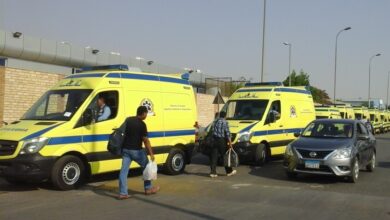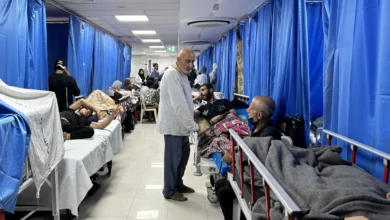The sight of an ambulance navigating the unbearably congested streets of Cairo, strangled between cars while carrying a patient struggling with time, has become part of the daily lives of most Egyptians.
Authorities, however, are implementing efforts to solve this problem all over Egypt. While ambulances in Cairo still face the daily challenge of reaching hospitals before it's too late, ambulances in Upper Egypt's two main cities, Luxor and Aswan, are taking a different route to their destination: the Nile.
The Nile Ambulance is a nationwide new project that began in the historical city of Luxor last year, where a number of boats were built to host all the necessary tools to save lives. The vessels were then released into the Nile to escort patients to hospitals.
“After the huge success of the project in Luxor, we decided to move it to the next level and took it to Aswan,” said Peter Matta, managing director of ICA Engineering, the company that provides this healthcare transportation system. “We started the second phase earlier in November, and we are planning on moving to the next city in couple of months as well.”
ICA has provided healthcare tools and training since 1979. The firm partners with a boat-building company. ICA then furnishes the aquatic ambulances with the necessary medical equipment.
“It is part of our company’s work to supply the Health Ministry of ambulances, Intensive Care Units (ICU) and train their paramedics on these tools,” said Matta. “This project has been on the agenda for the last three ministers of health, but it finally saw the light after the current minister, Dr. Hatyem al-Gabaly, dedicated a budget for renewing the ambulance fleet.”
“This way, the ministry of health has control over the land, the water and the air, through their helicopters.”
Dr. Nasser Rasmy, chairman of the board of the Egyptian Ambulance Authority, pointed out that opening this new phase in Aswan is “a milestone in our national emergency river transport project.” According to Rasmy, the transportation service has already been tied up with the emergency number in Egypt (123). Plans to go nationwide with the project, he says, are in effect.
“The success of this project has been greatly supported by the 999 Helwan Military Production Factory," said engineer Nabil Farid, who is also the managing director of WavesMaster, the local manufacturer of custom-made fiberglass boats. "The boats are tailored to be faster than regular boats. Seven and a half meter speedboats are made of fiberglass and can comfortably ferry three persons. Eleven meter speedboats, with the capacity to ferry ten persons, are also in the pipeline to provide emergency support in case of disasters.”
Rasmy adds that the project will also help tourism in Luxor and Aswan, as it provides better healthcare services to the tourists visiting the area.
“Moving the patients from the Nile cruises and the different islands in the Nile would be much easier this way, and with better results and equipments in the boats.“ ICA's Matta explained. “Saving those in stress is going an easier affair through these boats.”
“I believe we are heading to Cairo in half a year,” Matta said. “I think that this project is extremely helpful, because everyone is satisfied with its results so far. It is much easier to transport a patient from one side of the river to the other by boat rather than using the bridge.”




